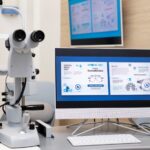Diabetes is continuing to rise globally. This means that its complications such as diabetic retinopathy are becoming more prevalent.
In recent years, Ozempic has gained attention as a treatment for type 2 diabetes. However, a question looms: what is the connection between Ozempic and diabetic retinopathy?
We’ve got you. Understanding this relationship is crucial for anyone managing diabetes. It may influence treatment choices and overall eye health.
So read on to find out more about their connection.

The Role of Ozempic in Diabetes Management
Ozempic (semaglutide) is a GLP-1 receptor agonist. It helps lower blood sugar levels in individuals with type 2 diabetes.
Ozempic enhances insulin secretion. It reduces glucagon release. It serves as an effective option for regulating glucose levels.
Studies have indicated that having optimal blood sugar control is great. It can reduce the risk of developing diabetic complications. It can even reduce the risk of diabetic retinopathy.
Tighter glucose control improves metabolic outcomes. It also appears to lower the incidence of diabetic retinopathy among patients.
You can use Ozempic to achieve better blood sugar regulation. So patients may indirectly reduce their risk of experiencing eye-related complications.

What Is Diabetic Retinopathy?
Diabetic retinopathy is a damaging eye condition. It is caused by prolonged high blood sugar levels, which can lead to vision impairment.
The disease typically progresses through different stages:
- mild nonproliferative
- moderate nonproliferative
- severe nonproliferative
- proliferative diabetic retinopathy
Early detection and management are critical. They help prevent irreversible vision loss.
Regular diabetic retinopathy screening is essential for early diagnosis and treatment. Patients should undergo comprehensive eye examinations at least once a year. This will help monitor any changes in their eye health.
Screenings can also help you answer the question “Can an eye exam detect diabetes?” Eye exams can identify early signs of diabetes complications. It allows for timely intervention.
So it’s important to discuss any concerns with your eye care doctor. So you need to ensure you receive the best possible care.
Can Diabetic Retinopathy Be Reversed?
The question of whether diabetic retinopathy can be reversed is complex. Early detection and treatment can halt disease progression. It can improve vision in some cases.
Laser therapy for diabetic retinopathy is often employed in advanced stages. It can help preserve vision. It can do so by targeting damaged blood vessels in the retina.
However, some lifestyle changes can also play a huge role in managing the condition. Diabetic retinopathy self-care practices include:
- maintaining healthy blood sugar levels
- controlling blood pressure
- adopting a well-balanced diet
These measures can reduce the risk of progression. It can even promote overall eye health.

Regular Screenings and Self-Care
To keep diabetic retinopathy at bay, regular screenings are vital. Most eye care professionals recommend that individuals with diabetes receive yearly eye examinations.
Early recognition of symptoms allows for timely interventions. This may prevent severe vision loss.
In addition to regular screenings, patients should remain vigilant about their eye health. This can empower individuals to take proactive steps in seeking appropriate care.
Connecting the Dots with Ozempic and Diabetic Retinopathy
Ozempic plays a vital role in managing blood sugar levels. It may help reduce the risk of complications like diabetic retinopathy.
Diabetic retinopathy may not be fully reversible. So adopting a proactive approach can mitigate its effects. Talking to your doctor about Ozempic and diabetic retinopathy is crucial.
So what are you waiting for? Act now by discussing your treatment options with your healthcare provider to prioritize your eye health.
Regular screenings and self-care are essential for maintaining overall health and early detection of potential issues.
Did you find this article helpful? If so, check out the rest of our site for more.







